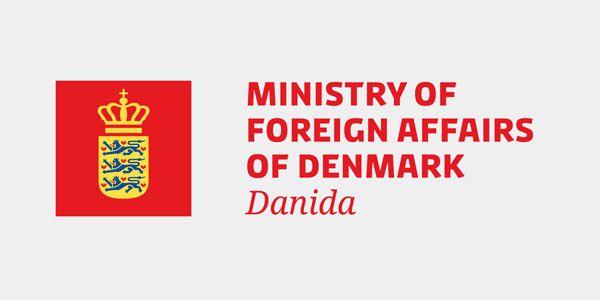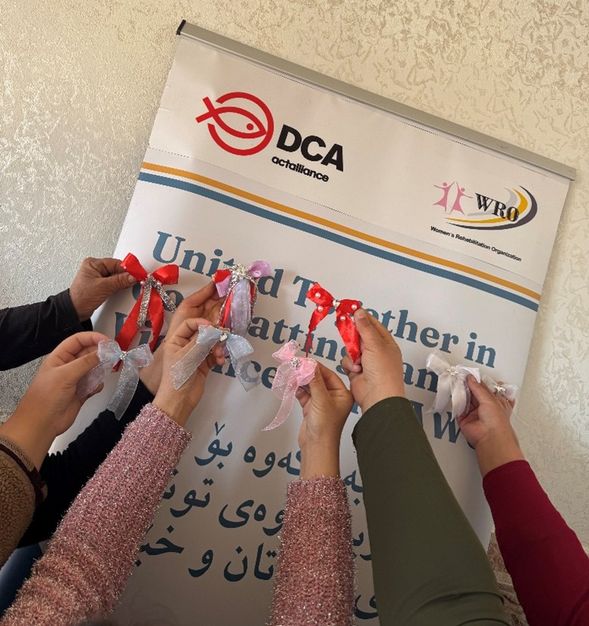In the heart of Koya, a town nestled in the Kurdistan Region of Iraq, 42-year-old Rodar sits at her sewing machine, the steady hum of stitching filling the small room. Around her, fabrics of vibrant colors are neatly folded, waiting to be transformed into dresses and garments. This business not only bring her income but symbolize resilience and hope.

A journey of survival and resilience
Born in 1982 in Qamishli, a Kurdish city in northeast Syria, Rodar once enjoyed a simple life working on her husband’s family farm. But in 2011, the outbreak of war shattered that peace. By 2012, she and her family were forced to leave everything behind, embarking on a perilous journey to Koya, Kurdistan.
With three daughters in tow, the journey to Koya took just a day but carried the weight of a lifetime. Her eldest daughter, only five years old, walked beside her, while her two younger daughters had to be carried – one on her husband’s shoulders and the youngest, just 18 months old, in her own arms.
Those days were filled with uncertainty and fear, I wrote everything down, the births, the marriages, our migration. My children would remember where they came from.Rodar recalls her commitment to preserving those memories for her children.
Rebuilding from nothing
Settling into Koya was far from easy. Without a job, her husband struggled to support their family, and they paid $100 in rent for a small space. Their children faced language barriers at school, coming home in tears, overwhelmed by the challenges of adapting to a new place.
Despite the difficulties, Rodar held onto hope. “These days will pass, and good days will come,” she would tell herself.
Her journey toward rebuilding her life took a turning point when a neighbor introduced her to the Women Rehabilitation Organization (WRO). There, she joined a parenting program and enrolled in a sewing course, while her daughters participated in children’s activities. “Before, I used to get angry quickly, and my husband and daughters would become upset too,” she admits. “But after learning new parenting skills, things improved. My husband and the girls noticed the change in me, and our home became more peaceful.”



Her husband, despite job insecurity, saw her progress and encouraged her to continue. His emotional support fueled her determination to complete the sewing course. When she finally did, she received her very own sewing machine from WRO.
Sewing her way to independence
With her new skills and equipment, Rodar made her first garment – a Kurdish dress for Newroz, the Kurdish New Year. “When women asked who made it, I proudly said, ‘Me!’” she recalls with a smile.
Her first customer was a neighbor who handed her a photo of a dress on her phone, asking if she could replicate it. For her work, Rodar earned 5,000 Iraqi dinars (about $3), a modest start that sparked a steady flow of loyal customers.
“At first, people were afraid I’d ruin their textiles,” she shares. “But my husband reassured me, saying, ‘Even if you make a mistake, I’ll buy you more fabric.’ His support gave me confidence.”

Now, Rodar earns between $250 and $300 a month, and during busy seasons like Newroz and winter, her income increases. She manages her time with precision—sewing in the mornings and afternoons while her daughters do their homework beside her. “Even when I feel tired, it’s not the kind of tiredness that weighs me down. This work has made me stronger and more optimistic,” she says.
Empowering Other Women
Rodar’s impact extends beyond her own family. Last year, she taught four women in her community how to sew, empowering them to earn their own incomes. “I dream of opening my own tailoring workshop and teaching other women, so they can gain independence too,” she says with determination.
Her greatest wish, however, is for her children to succeed academically. “I only studied through elementary school, but I want my children to go to university and beyond,” she says.
Rodar is deeply grateful for the support she received from WRO, acknowledging how it transformed her life.
Thanks to them, I have confidence and the ability to earn money. When a mother has her own income, she can meet her children’s needs without hesitation.”Rodar expresses her gratitude for the help she received from WRO.
Reflecting on her journey, she adds, “If I could go back to those hard days, I would tell myself, ‘Look where you are now. The tough times are over. Be proud of yourself.’ My daughters believe that one day I’ll buy a house and a car for our family. And you know what? I believe it too.”
A Vision for the Future
Rodar’s journey from conflict to empowerment is a testament to resilience and hope. Her story stands at the needs of survival, but go further towards thriving against all odds. Through her work, she is building a foundation for her children’s future and inspiring other women to do the same.
Her dream of owning a tailoring workshop is no longer just a vision; it’s becoming a reality, one stitch at a time.

“Thinking back on those hard days, I tell myself, ‘Look where you are now. The tough times are over. Be proud of yourself.’ My daughters believe that one day I’ll buy a house and a car for our family. And you know what? I believe it too.”
About the project
United in Combatting Violence Against Women and Girls
The project, implemented by Women Rehabilitation Organization (WRO) in partnership with DanChurchAid, aims to strengthen protection and livelihood services for vulnerable communities in Erbil and Dohuk, particularly those affected by camp closures.
With a focus on empowering women, girls, and children, the initiative emphasizes vocational training, large-scale well-being activities, and Violence Against Women and Girls (VAWG) services to reduce dependency on negative coping strategies.
Through workshops and community-led training, the project promotes self-reliance and resilience, ensuring that displaced populations can thrive even outside formal camps.
This project is funded by Danida.




